

The death toll has exceeded 40,000 since the Israel-Hamas conflict broke out on Oct 7, 2023.
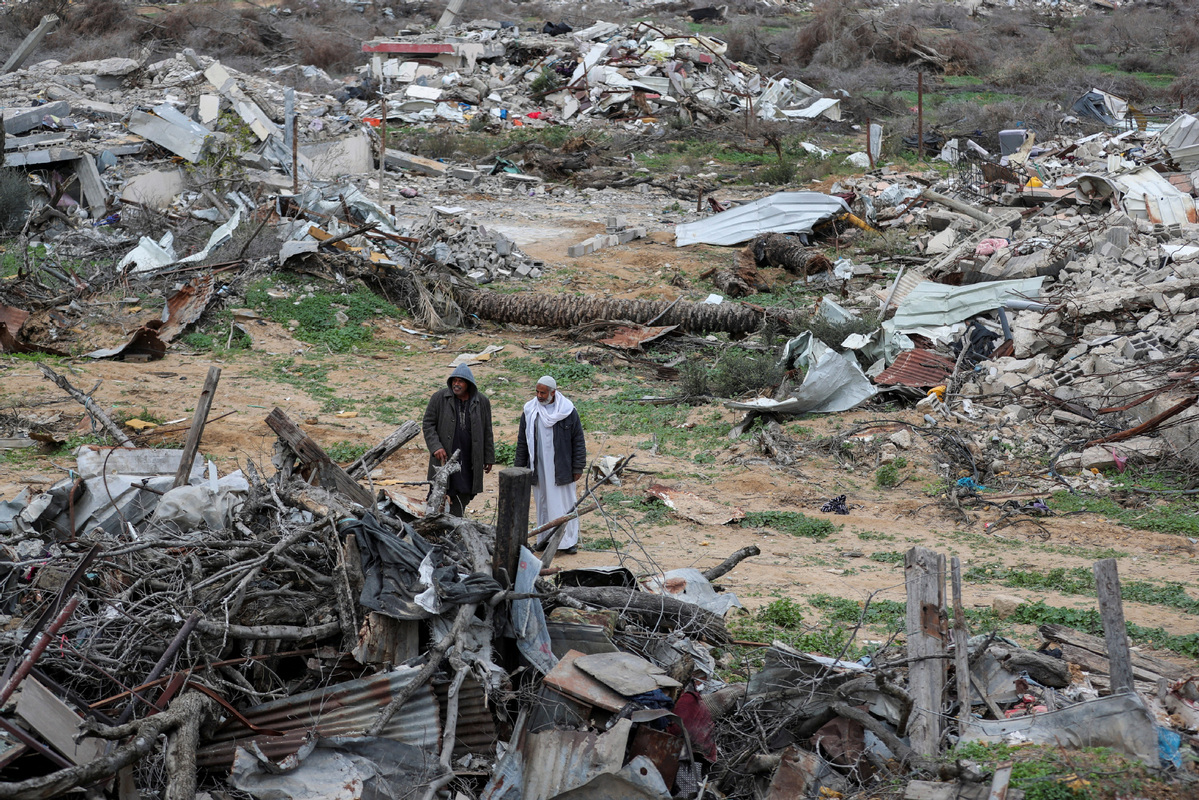
JERUSALEM -- Israeli forces have begun withdrawing from a key area in Gaza as part of the Israel-Hamas ceasefire agreement that took effect last month, an Israeli government official said on Sunday.
Speaking on condition of anonymity, the official told Xinhua that the pullout from the area dubbed by Israel as the Netzarim Corridor -- a strip of land that bisected Gaza from north to south -- is expected to be completed by late Sunday.
The Israeli military had established posts in the corridor during its 15-month-long assault on Gaza. An Israeli security official, talking to Xinhua anonymously, said that the military was "preparing to implement the agreement according to the guidelines of the political echelon."
Footage circulating on social media appeared to show troops setting fire to furniture and unidentified boxes at their bases, with a soldier heard shouting, "We will leave nothing for the Gazans."
The 42-day ceasefire between Israel and Hamas took effect on Jan 19. Under the agreement, Israel committed to withdrawing its forces from the area. With the truce now past its midpoint, negotiations mediated by Qatar, Egypt, and the United States are set to determine whether the ceasefire will continue into its second phase, which would include the release of more hostages and Palestinian detainees.
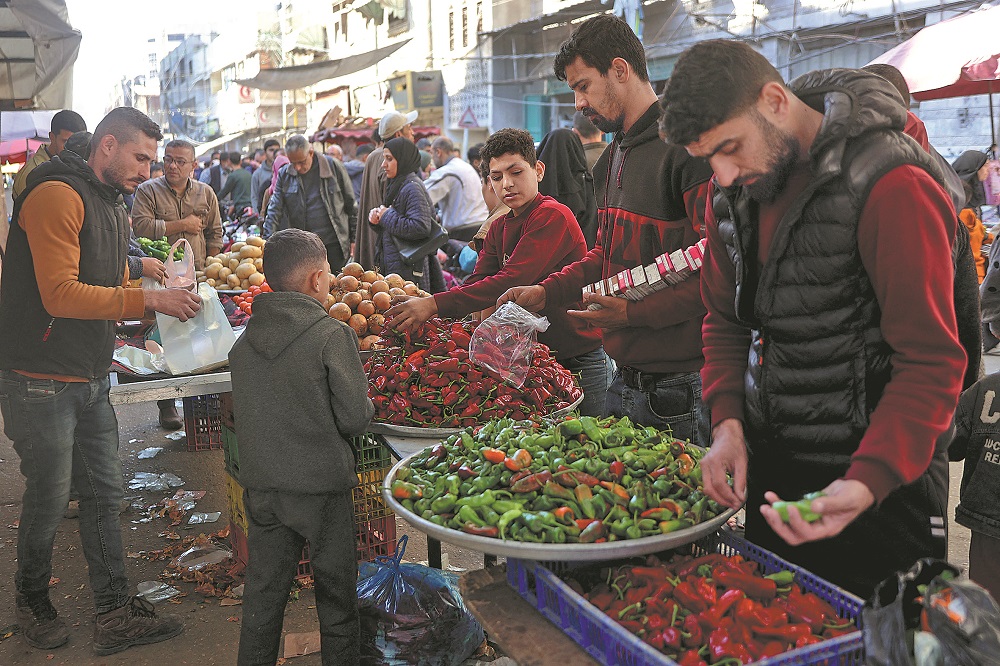
The Palestinian government has condemned Israel's aggression in the occupied West Bank and urged US President Donald Trump to intervene as casualties continue to rise.
Israel has pushed ahead with its military operations despite the resignations of military chief Herzi Halevi on Wednesday, citing "the failure of Oct 7", and Yaron Finkelman, head of its southern military command, which is responsible for Gaza.
Nabil Abu Rudeineh, spokesman for the Palestinian presidency, accused the Israeli government of escalating tensions. He warned that Israel's actions in the West Bank constitute a "silent war" aimed at creating "a climate of violence and tension", Wafa news agency reported. Trump, expressing skepticism about the Gaza cease-fire, told reporters that the enclave needs to be rebuilt in a "different way". He earlier revoked sanctions against Israeli settlers involved in violence in the West Bank.
Rudeineh said lifting the sanctions has "encouraged them to commit more of these crimes".
"We call on the new American administration to intervene to stop these crimes and Israeli policies that will not bring peace and security to anyone, stressing that the only way to achieve security and stability is to implement international legitimacy resolutions and the Arab Peace Initiative as a basis for resolving the Palestinian issue," he said.
Farhan Mujahid Chak, a visiting faculty at the Walsh School of Foreign Service at Georgetown University in Washington, told China Daily that Trump had been "instrumental in getting the cease-fire in place" but the future is uncertain.
It remains to be seen how the international community, including the United Nations, will intervene and make it "more difficult for Israel to continue bombing", Chak said.
The decisions by both Trump and his predecessor Joe Biden to get a cease-fire deal while "enabling genocide" by sending billions of dollars and weapons to Israel highlight the "complexity and hypocrisy" of US politics.
Israeli rights group B'Tselem accused Israel of using the Gaza cease-fire as an excuse to increase oppression in the West Bank.
"The ink had barely dried on the cease-fire agreement before the Israeli army blocked most access points to and from Palestinian villages and all the cities in the West Bank, severely disrupting the daily lives of more than 3 million Palestinians," the group said in a statement.
'True intentions' visible
The military activity of the Israeli army in the West Bank to the conflict's "official objectives" just two days before the Gaza cease-fire came into effect "speaks volumes about the Israeli government's true intentions", it added.
"Forced to stop the fighting in Gaza by the Americans and Saudis, the Israeli government is using this pause as an excuse and opportunity to ratchet up the oppression of West Bank Palestinians. "This is not what a cease-fire looks like," it said.
The office of Israeli Prime Minister Benjamin Netanyahu said on Tuesday that on the directive of the Security Cabinet, both the military and the police have begun extensive and significant military operations "to defeat terrorism in Jenin" or what it called the "Iron Wall" in the West Bank.
Gokhan Batu, an analyst on Israeli studies at the Center for Middle Eastern Studies in Turkiye, told China Daily that the resignations of senior Israeli military officials stemmed from two reasons.
The first is accountability at both the tactical and strategic levels, Batu explained. The second is political, he added, citing divisions between the military leadership and the government that began in early 2023 over judicial reforms.
"The strategy concerning the ongoing war in Gaza became another point of contention. Netanyahu's reluctance to articulate a clear postwar governance plan for Gaza or propose alternatives to Hamas faced veiled criticism from the military," he said.
"It is crucial to underline, however, that the ultimate political responsibility lies with Netanyahu and his national security team.
"Consequently, the government appears to be shifting the blame solely onto the military leadership as a strategy to navigate the political turbulence expected in the postwar period. The Chief of Staff is poised to become a scapegoat in this process," he said.
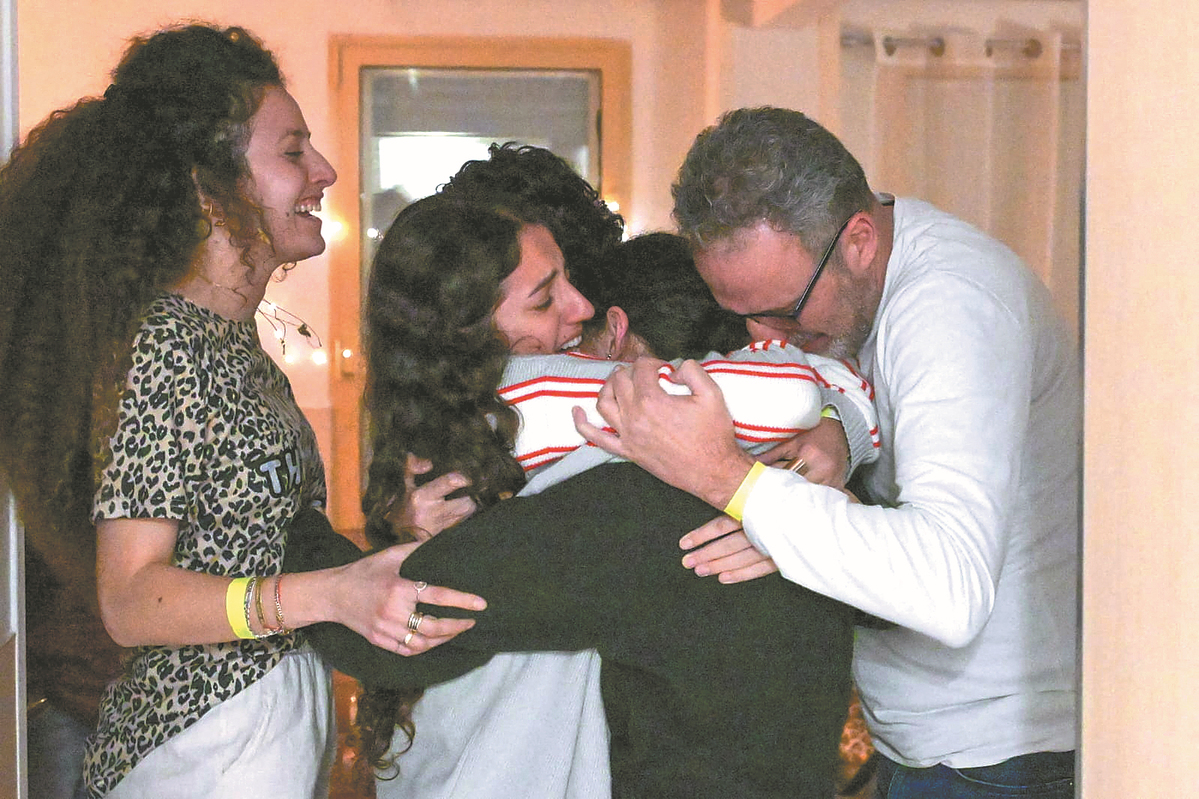
Israel released 90 Palestinian prisoners on Monday after Hamas handed over three Israeli hostages, completing the first exchange of a truce aimed at pausing 15 months of conflict in Gaza.
The move was hailed by the United Nations, which is urging more much-needed aid to the devastated enclave.
The three female hostages released on Sunday were reunited with their families and will remain in hospital for several days — all in stable conditions, The Times of Israel reported.
Hours later, in the West Bank, the released Palestinian prisoners — 69 women and 21 teenage boys — left Ofer Prison on buses at around 1 am, with crowds celebrating their arrival in the nearby town of Beitunia.
As the cease-fire took effect on Sunday morning, thousands of displaced Palestinians, carrying tents, clothes and personal belongings, set off across the Gaza Strip to return home.
In Deir al-Balah central Gaza, Umm Hasan al-Buzom, 70, said she would even "crawl my way back home" if needed. "But we can't return for fear that the (Israeli) occupation forces might shoot at us."
The initial 42-day truce, brokered by Qatar, Egypt and the United States, calls for fighting to stop, aid to be sent into Gaza and 33 of the nearly 100 remaining hostages to go free over the six-week first phase in return for nearly 2,000 Palestinians in Israeli custody. It intends to pave the way for a permanent end to the conflict, but a second phase has yet to be finalized.
Fireworks were launched in celebration as buses carrying the 90 freed Palestinians arrived in Ramallah on the West Bank, where thousands of people were waving the Palestinian flags and filming the scenes on their phones.
Ahmed Abu Ayham, a 40-year-old from Gaza City, said that while the cease-fire may have spared lives, the losses and destruction made it no time for celebration. "We are in pain, deep pain and it is time to hug one another and cry," he said.
There is still no detailed plan in place to govern Gaza after the conflict, much less to rebuild it.
More than 47,000 Palestinians have since been killed in Israeli attacks. Nearly the entire 2.3 million population of Gaza is homeless. About 400 Israeli soldiers have also died.
China welcomes the Gaza ceasefire agreement coming into effect, Foreign Ministry spokeswoman Mao Ning said at a regular news briefing on Monday.
"We hope that the agreement will be fully and continuously implemented, and that a comprehensive and permanent cease-fire in Gaza will be achieved," she said.
"China will continue to work with the international community to promote peace and stability in the Middle East."
Removing obstacles
In a statement, UN Secretary-General Antonio Guterres welcomed the cease-fire and hostage release.
"We stand ready to support this implementation and scale up the delivery of sustained humanitarian relief to the countless Palestinians who continue to suffer. It is imperative that this cease-fire removes the significant security and political obstacles to delivering aid," he said.
Until the truce, Israel had complete control over the volume and nature of aid allowed into Gaza.
The UN has said that reconstruction could take more than 350 years if Gaza remains under Israeli blockade.
Using satellite data, it estimated last month that 69 percent of Gazan structures had been damaged or destroyed, including more than 245,000 homes. With more than 100 trucks working full-time, it would take 15 years just to clear the rubble away.
Meanwhile, more than 630 trucks transporting humanitarian supplies entered the Gaza Strip on Sunday, with at least 300 of them traveling to the territory's besieged and bombed north, said Tom Fletcher, the UN's under-secretary-general for humanitarian relief.
However, Fletcher also warned that there is still "no time to lose" in getting aid into Gaza. "After 15 months of relentless war, the humanitarian needs are staggering," he said on social media.
Agencies contributed to this story.

JERUSALEM - While obstacles persist, Israel and Hamas appeared to move closer on Monday to a potential ceasefire in Gaza, which would involve the release of hostages held for over 15 months.
Officials from Israel, Palestine, and the United States voiced cautious hope for a breakthrough in the coming days. An Israeli official, speaking to Xinhua, confirmed that mediators from Qatar, Egypt, and the United States had presented a draft proposal to both sides, with Israeli leaders briefed on its details. The number and identities of hostages and Palestinian prisoners slated for release, however, remain unresolved.
Negotiations are "in advanced stages", according to another Israeli government source, who estimated a deal could be finalized "within a day". Meanwhile, a senior Hamas official based in Doha said the group had delivered a "positive" response to the draft agreement mediated in Qatar.
"Hamas has raised no objections to the proposal, hoping a ceasefire can soon alleviate the suffering of Palestinians in Gaza," the official said.
Israel's state-owned Kan TV reported that the draft agreement outlines a three-stage plan. The first stage includes a 42-day ceasefire during which 33 hostages -- women, children, elderly individuals, and those with health conditions -- would be released. The Israeli military would withdraw from densely populated areas, allowing displaced Gazans to return to their homes in northern Gaza. Additionally, Israeli forces would vacate the Philadelphi Corridor along the Egyptian border and the Netzarim Corridor, separating Gaza's north and south.
By the 16th day of the ceasefire, talks would commence on subsequent phases, which include the delivery of urgently needed aid to Gaza and the release of a significant number of Palestinian prisoners held in Israeli jails, the report said.
Israeli Foreign Minister Gideon Sa'ar acknowledged "progress" in the negotiations, adding that teams were "working hard" to finalize the deal.
White House National Security Adviser Jake Sullivan offered cautious optimism: "We've been close before and failed to cross the finish line. But the opportunity for a final agreement is within reach, and the steps to implement it could begin in the coming days."
By Monday evening, Israel's Hostages, Missing Persons, and Returnees Directorate declared its readiness for a potential agreement, citing weeks of preparation alongside government agencies to facilitate the return of hostages and their reintegration with their families.
Efforts to reach a deal have repeatedly faltered over key issues, including the permanence of a ceasefire, the scope of Israel's military withdrawal, and the release of Palestinian prisoners. Israel remains hesitant to release prisoners convicted of attacks on Israelis.
Internal political opposition also poses a significant challenge to Israeli Prime Minister Benjamin Netanyahu. Ultra-nationalist coalition partners Bezalel Smotrich and Itamar Ben-Gvir have publicly condemned the deal. Smotrich described it as a "catastrophe" for national security and called for the total military occupation of Gaza. "This is the time to strike with full force, retake Gaza, and dismantle Hamas until it surrenders completely," he said.
Despite his objections, Smotrich has not threatened to withdraw his party from Netanyahu's coalition, which relies heavily on support from pro-settler factions.
The conflict escalated dramatically on Oct 7, 2023, when Hamas militants launched an unprecedented attack on southern Israel, killing 1,200 people and taking around 250 hostages. To date, 98 hostages remain in captivity, with at least a third believed to have died.
Israel's military response has inflicted widespread destruction across Gaza. On Monday, health authorities in the Hamas-run territory reported that Israeli strikes had killed at least 46,584 people.
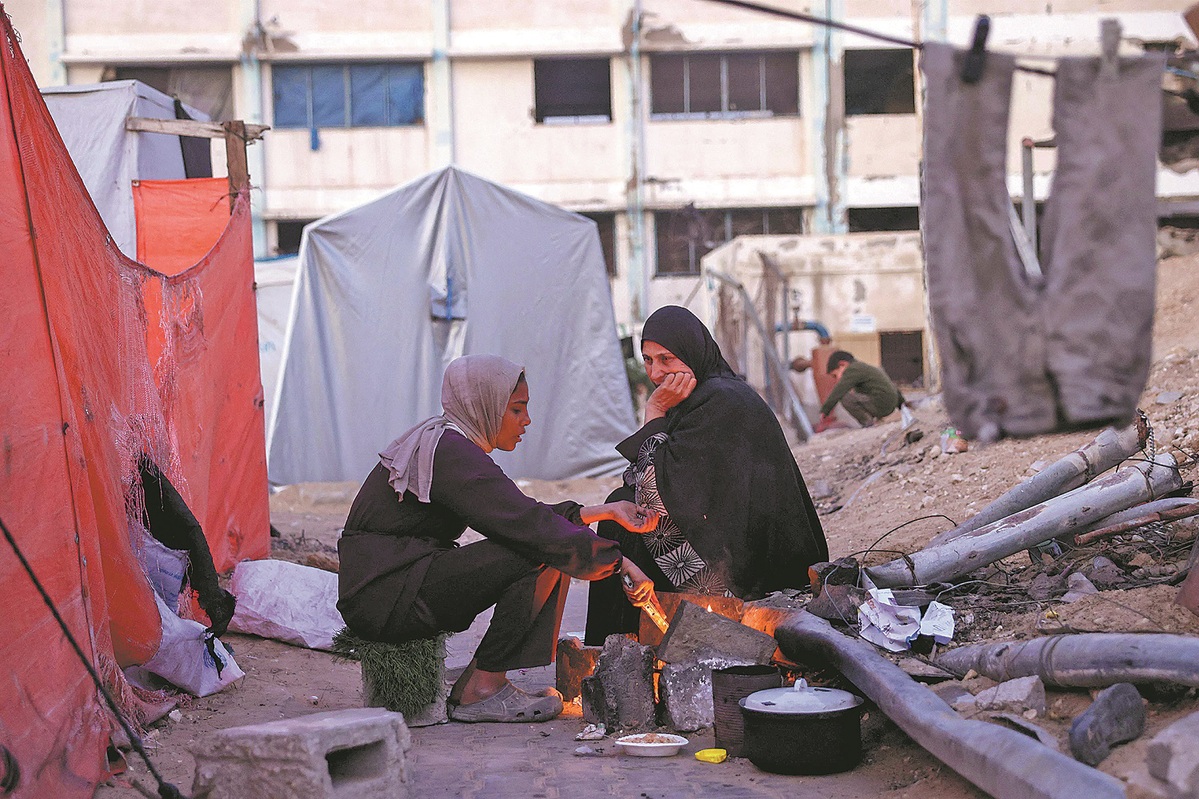
Israel's military said on Sunday that forces had killed about 20 Palestinian militants in a raid on a northern Gaza hospital, calling it one of its "largest operations" conducted in the territory.
The assault on Kamal Adwan Hospital in northern Gaza's Beit Lahia area began early on Friday, and the World Health Organization said it left the area's last major health facility emptied of patients and staff.
"During the operation, approximately 20 terrorists were eliminated, and powerful explosive devices planted by the terrorists were neutralized," the military said in a statement released on Sunday.
The raid concluded on Saturday after the military said it had apprehended "240 terrorists" belonging to the Hamas and Islamic Jihad militant groups. The military also said it had detained the hospital's director, Hossam Abu Safiyeh, whom it suspects is a Hamas militant.
"This is one of the largest operations to apprehend terrorists conducted in a single location since the beginning of the war," the military said on Sunday.
The WHO has joined growing calls demanding the immediate release of Safiyeh, whose whereabouts remain unknown, warning that hospitals have again become "battlegrounds".
In a post on X, WHO chief Tedros Adhanom Ghebreyesus urged Israel to ensure that patients' and medical workers' healthcare needs and rights are upheld even as attacks continue.
He said Al-Ahli Hospital and Al-Wafa Rehabilitation Hospital in Gaza City also faced attacks and "both are damaged".
Arab League Secretary-General Ahmed Aboul-Gheit also condemned Israel over the burning of Kamal Adwan Hospital.
In a statement published by the Kuwait News Agency or KUNA, Aboul-Gheit said that Israel's "war crimes" in Gaza would not be forgotten and that the international silence toward these crimes was a "stain on the world conscience".
He stressed that targeting the hospital and its personnel and besieging it for weeks was "an unprecedented insistence on dehumanization of Gazans".
In an update on Saturday, the Euro-med Human Rights Monitor published some harrowing testimonies of serious crimes committed by the Israeli army against civilians during the storming of Kamal Adwan Hospital and the surrounding areas.
Overnight, hundreds of tents were flooded in displacement camps in different areas of the Gaza Strip due to heavy rains, Wafa news agency reported. It said the displaced, particularly in Deir al-Balah, and Al-Mawasi in Khan Younis in the southern Gaza Strip, spent a harsh night inside their cold and flooded tents.
A sixth infant died of cold in the Gaza Strip on Monday in less than a week as winter set in amid the lack of heating facilities, Wafa news agency reported. A few days ago, four victims between the ages of 4 and 21 days died due to severe cold.
Agencies contributed to this story.
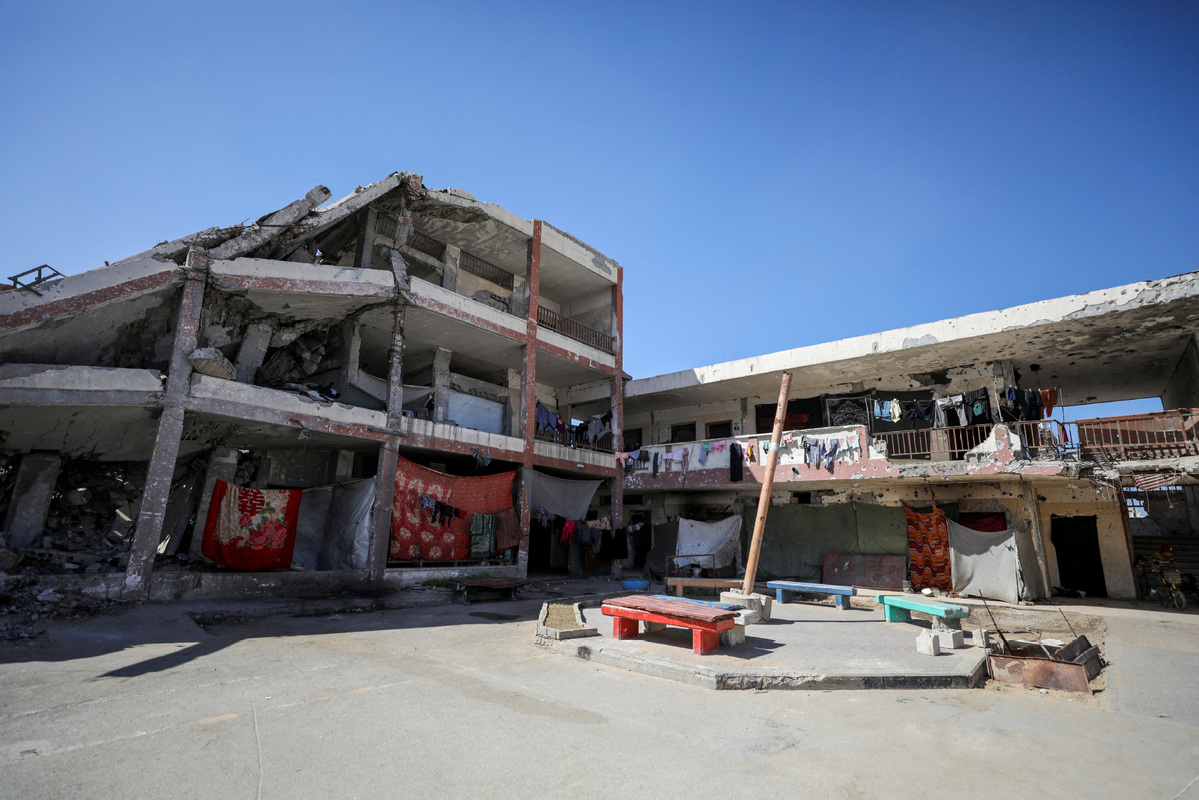
GAZA -- At least 17 Palestinians were killed, including nine children, by the Israeli bombing on the Shuhada al-Nuseirat school in the central Gaza Strip on Thursday, the Hamas-run Gaza government media office said.
The attack also left more than 52 others injured and a number of persons missing, the media office said in a statement, adding that the school sheltered thousands of displaced persons, and the majority of them are children and women.
The Israel Defense Forces (IDF) said in a statement on Thursday that the Israeli Air Force conducted a strike on Hamas militants who were operating inside a command and control center in the area of Nuseirat.
The command and control center, which was embedded inside a compound that previously served as the Shuhada al-Nuseirat School, was used to plan and execute attacks against IDF troops and the State of Israel, it added.
Israel has been conducting a large-scale offensive against Hamas in the Gaza Strip to retaliate against a Hamas rampage through the southern Israeli border on Oct 7, 2023, during which about 1,200 people were killed and about 250 taken hostage.
The Palestinian death toll from ongoing Israeli attacks in the Gaza Strip has risen to 42,847, Gaza-based health authorities said in a statement on Thursday.
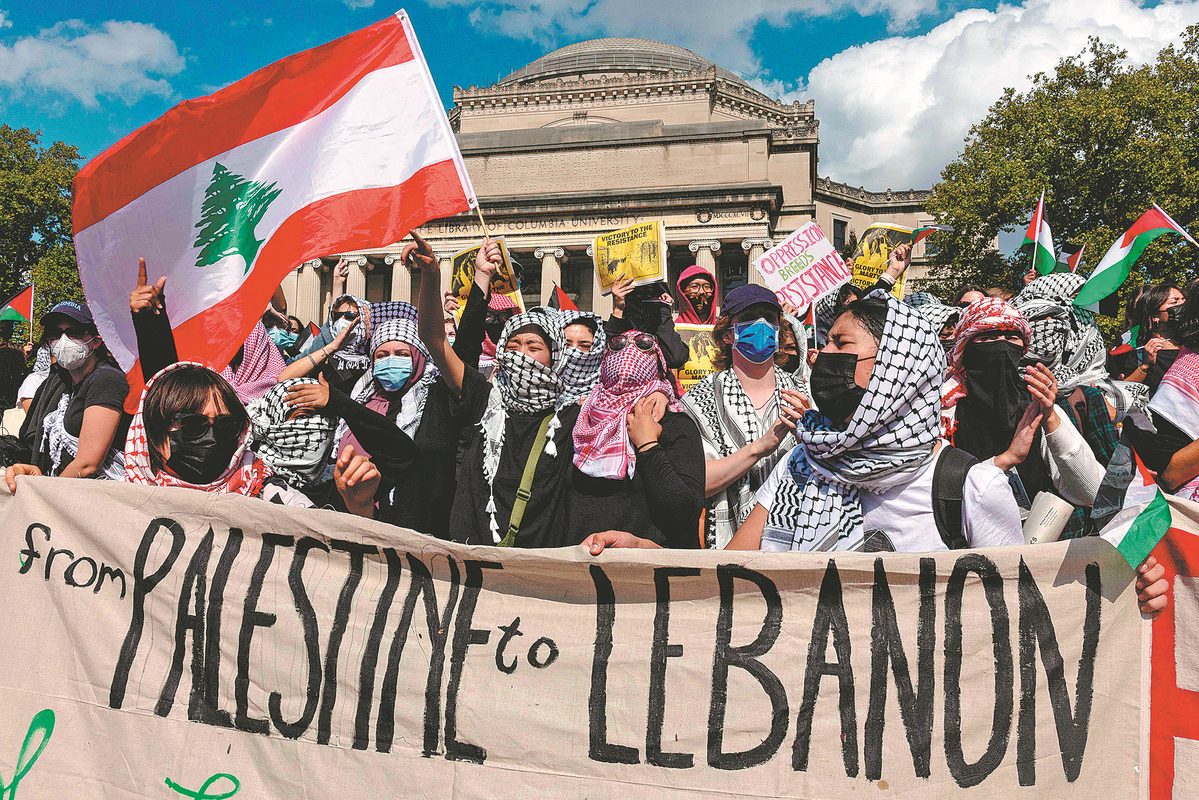
Thousands of pro-Palestinian protesters, including students from Columbia University, City University of New York and more than a dozen other New York universities, walked out of class to march through the streets on Monday, the first anniversary of the Palestine-Israel conflict, triggered by the Oct 7, 2023, Hamas attacks.
Chanting slogans and holding placards that read "Free Palestine", the students, many wearing keffiyeh scarves, began marching at 4:30 pm from Lower Manhattan.
The protesters walked to Washington Square Park, Union Square and Wall Street, where they unfurled a massive Palestinian flag in front of the New York Stock Exchange. They encountered pro-Israeli counterprotesters, and angry words were exchanged.
The march continued to Fifth Avenue, snarling traffic, and proceeded toward Times Square, where counterprotesters carried large Israeli flags. The pro-Palestinian protesters then headed to Columbus Circle at 59th Street to join a large citywide protest.
Rabbi Asher from Brooklyn said: "Today I think of the hostages taken. What we need is peace. Then I feel hopeful for a better future. The way to have peace is through strength. We must help each other."
Muhammed, a pro-Palestinian student protester who declined to give his surname, said: "We must call an end to genocide. I'm here protesting for the Palestinian people. I'm not going to stop until they are free. Free Palestine!"
While the street protests were mainly peaceful, in the afternoon, red graffiti reading "Divest Now "and smashed windows were found at a City University of New York building in Hamilton Heights.
At Columbia University in Manhattan, the epicenter of the original anti-Israel protests, security barriers were erected. By midmorning, part of the school grounds were closed to visitors, with access restricted to those carrying ID cards.
A memorial for the victims of the conflict was set up, displaying their pictures on large cardboard milk cartons, positioned in the same area where an anti-Israel encampment had stood in the past academic year.
Security tightened
Interim Columbia University President Katrina Armstrong said heightened campus security and building restrictions would be in effect through Wednesday to prevent the "risk of violence to any member of our community".
In New York, home to the largest Jewish population outside of Israel, the New York Police Department stepped up patrols and security measures. At least two people were arrested by early evening, the NYPD said.
In the afternoon, protesters picketed the home of Rebecca Weiner, NYPD deputy commissioner of intelligence and counterterrorism. A picture of one of the signs held outside Weiner's house read, "Abolish NYPD Counter terrorism", an Instagram post by Unityoffields showed.
The group wrote on Instagram, "The movement for a free Palestine cannot and will not be locked behind or shut out by campus gates."
A candlelit ceremony was held by the Jewish community in the evening in Central Park, with some of the hostages' families attending. Mayor Eric Adams and New York State Governor Kathy Hochul were also present.
Shai Davidai, an assistant professor at Columbia Business School, led a pro-Israeli protest. A "Flood Columbia" protest and "Columbia United Against Terror" rally were held outside campus grounds.

Editor's note: As the world marked the anniversary of the Palestine-Israel conflict, triggered by Hamas' Oct 7 attacks on southern Israel, this page captures the heightened tensions and multifaceted conflicts gripping the Middle East and beyond. These reports reflect on the effect of recent developments and the broader pursuit of peace and justice.
As the world marked the anniversary of the Palestine-Israel conflict, Iran reiterated on Monday it does not seek to aggravate tensions in the Middle East but would give a strong and appropriate response to any new act of Israeli aggression.
Iranian Foreign Minister Abbas Araqchi remarked in a phone conversation with his Egyptian counterpart Badr Abdelatty, where they discussed the latest developments in the region, the official Islamic Republic News Agency reported.
"The Islamic Republic of Iran does not seek to escalate tensions and war in the region, but it is not afraid of war either," IRNA quoted Araqchi as saying. "It will give a strong and appropriate response to any new move and adventurism by the Zionist regime."
Last week, Iran launched a barrage of ballistic missiles at Israeli military and intelligence bases in retaliation for Israel's campaign of aggression and assassination in the region. Araqchi and Abdelatty also renewed their calls for a cease-fire in Gaza, an end to Israeli attacks on Lebanon and the delivery of humanitarian aid to refugees.
On Oct 2, Araqchi said on X that his country exercised self-defense under Article 51 of the United Nations Charter, and that it did so "after exercising tremendous restraint for almost two months, to give space for a cease-fire in Gaza".
"Israel's enablers now have a heightened responsibility to rein in the warmongers in Tel Aviv instead of getting involved in their folly," Araqchi wrote.
Article 51 of the UN Charter states that nothing in the present Charter "shall impair the inherent right of individual or collective self-defense if an armed attack occurs against a Member of the United Nations, until the Security Council has taken measures necessary to maintain international peace and security".

The regional tensions triggered a year ago by the Palestinian armed group Hamas' attack on southern Israel have spiraled into a series of Israeli operations by land and air over Lebanon and direct attacks by Iran onto Israeli military installations.
Hezbollah deputy chief Naim Qassem said on Tuesday the group supported Lebanese efforts for a cease-fire with Israel, after two weeks of Israeli strikes that killed its leader.
"We support the political efforts that (Lebanese Parliament Speaker) Nabih Berri is undertaking toward a cease-fire," Qassem said in a televised speech.
Israel kept up the pressure on Hezbollah on Tuesday by launching new operations in southern Lebanon.
The latest escalation followed Prime Minister Benjamin Netanyahu's vow to fight a "sacred war "until Hezbollah and Hamas are defeated.
Hamas' Oct 7 attacks sparked Gaza's deadliest-ever conflict, which, according to the Health Ministry in the Hamas-run territory, has killed nearly 42,000 people, most of whom are civilians.
Gaza's civil defense agency said on Tuesday an Israeli strike killed at least 17 people at a refugee camp in the center of the territory, as Israel's military targets Hamas positions.
On Monday, UN experts issued a statement reiterating their call for all parties to end hostilities and demanding accountability after a year of human loss and suffering, as well as a blatant disregard for international law.
"We continue to urge the international community to ensure an end to transfers of arms by states and companies to Israel, including through proxies, to avoid responsibility in war crimes and crimes against humanity by complicity," the statement said.
The experts said they were alarmed by the "expansion of the violence and hostilities in other countries in the region", in particular the escalation in Lebanon, which has killed more than 2,000 people, including women and children, injured more than 9,500, and displaced hundreds of thousands more.
"This spillover of hostilities blatantly undermines international law and the UN Charter and endangers peace and stability of a region that has suffered decades of conflicts," the statement said.
Speaking on Monday at the end of a four-day tour of the Middle East, French Foreign Minister Jean-Noel Barrot said Israel's security cannot be guaranteed with military force alone and will require a diplomatic solution.
"Military success cannot be a substitute for a political perspective," Barrot told a news conference in Jerusalem.
He said it was odd to call for a cease-fire while giving offensive weapons, echoing French President Emmanuel Macron's call for a halt to arms deliveries to Israel.
Agencies contributed to this story.
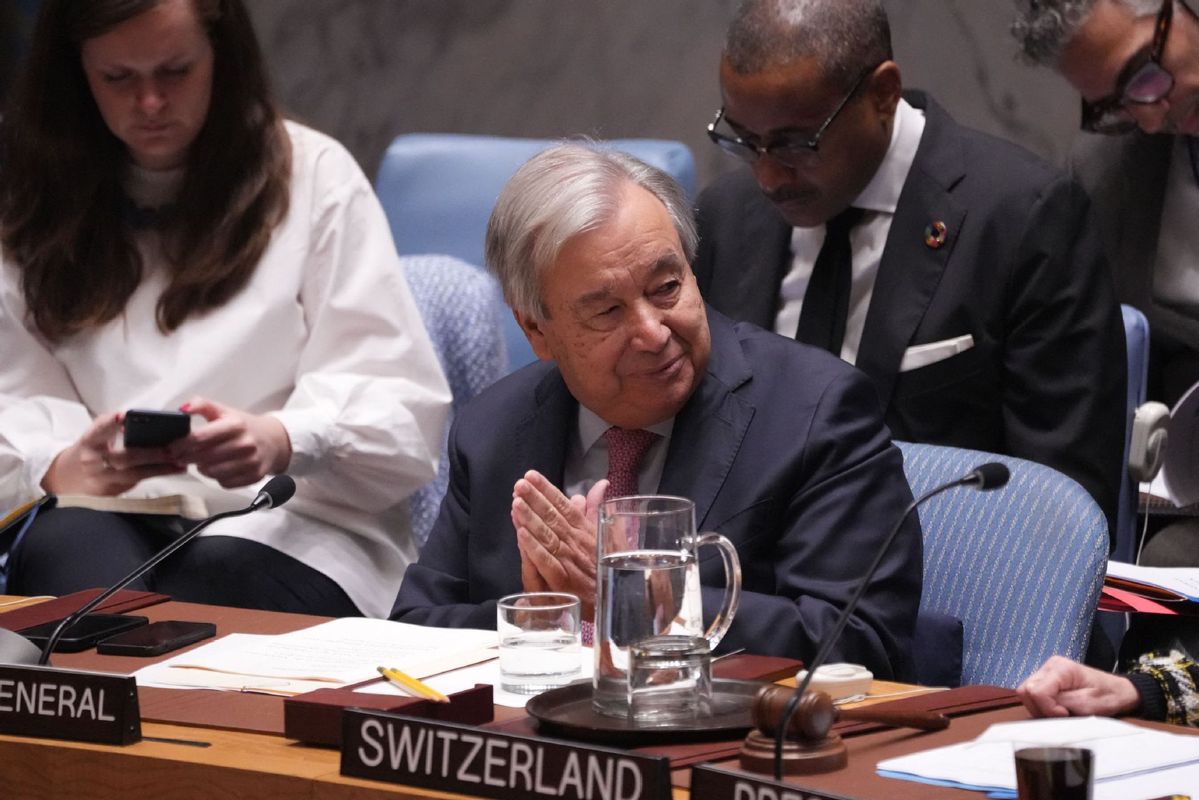
A year after Hamas launched attacks on Israel, the United Nations on Monday reiterated calls for the release of all hostages and for an immediate cease-fire.
The Israeli-Palestinian conflict that erupted since that day has expanded across the Middle East, affecting countries such as Lebanon, Yemen, Iran and Syria.
On Monday, the Israeli military announced airstrikes on Hamas positions in Gaza to mark the anniversary of the Oct 7, 2023, attacks. On that day, Hamas fighters infiltrated Israel in an attack that killed more than 1,100 people. More than 200 were taken hostage, with many of them still being held today.
Meanwhile, on Monday, heavy explosions rocked southern Beirut again, as Israeli forces continued to bombard the city. A Hezbollah rocket attack on Haifa, Israel, injured at least 10 people, according to Al Jazeera.
China calls for the "effective respect of the sovereignty, security and territorial integrity of all countries, opposes all acts that violate basic norms governing international relations, and condemns all violent attacks against civilians", Fu Cong, China's permanent representative to the United Nations, said Monday during the UN General Assembly on reforming the UN system.
"Palestine's long-held aspiration to establish an independent state should not be shunned anymore, and the historical injustice suffered by the Palestinian people should not be ignored any longer," Fu said.
UN Secretary-General Antonio Guterres on Monday issued a video message calling on Hamas to release hostages.
"This is a day for the global community to repeat in the loudest voice our utter condemnation of the abhorrent acts of Hamas, including the taking of hostages," Guterres said.
"I demand once again the immediate and unconditional release of all hostages. Until then, Hamas must allow the International Committee of the Red Cross to visit those hostages," he said.
The UN's top official did not criticize Israel in his statement, which led some reporters to describe it as "unbalanced" during the news conference.
Guterres' statement does not contradict what the secretary-general has said since, regarding the Palestinian people and Lebanon, said Stéphane Dujarric, the spokesperson for the secretary-general. It specifically condemned the Hamas attacks and does not imply any change in the secretary-general's stance, Dujarric said.
Israeli Foreign Minister Israel Katz last week declared Guterres "persona non grata" in Israel and banned him from entering the country.
The Israeli mission to the UN held a memorial service for victims of the Oct 7 attacks at UN headquarters in New York on Monday, and did not invite the UN secretary-general.
Iran launched approximately 180 ballistic missiles at targets in Israel last week in what Teheran said was retaliation for the recent killings of top Hezbollah and Hamas officials.
Israel's Ambassador to the UN Danny Danon said on Monday that the nation is deciding when and where to retaliate against Iran for the missile barrage.
"It will happen … it will take place," said Danon. "There will be a response," and Iran "will pay the price for their actions", he said.
UN General Assembly President Philemon Yang on Monday released a statement calling for "an immediate cease-fire, the immediate and unconditional release of all hostages and a return to dialogue with a view to finding diplomatic solutions to the conflicts in the region".
"I call for all parties — Israel, Hamas, and Hezbollah — to abide by their obligations under international law, including international humanitarian law. I also urgently call for the protection of civilians and the unimpeded access to the much-needed humanitarian assistance," Yang said.
According to data released by the Gaza Ministry of Health on Sunday, in the past 24 hours, the Israeli military operation has caused 45 deaths. Since Oct 7, 2023, more than 40,000 people have been killed, the ministry said.
minluzhang@chinadailyusa.com
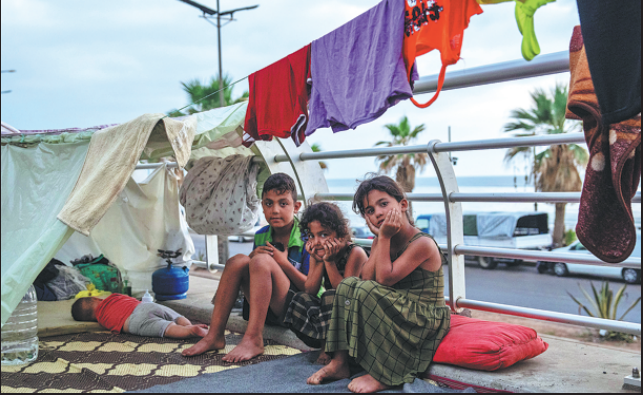
Negotiations have so far failed to produce peace one year after the conflict in the Gaza Strip broke out. Meanwhile, concerns have also been raised about Lebanon's future and whether the country could become another Gaza.
Hezbollah and Israel have exchanged nearly daily fires on the border area since the outbreak of this round of Israeli-Palestinian conflict, which started on Oct 7 last year. But the fighting has intensified since the Israeli military shifted its focus from the Gaza Strip to Lebanon.
Since Israel launched ground operations inside southern Lebanon on Sept 30, the Israeli military said on Saturday that its forces had killed more than 400 Hezbollah fighters, including 30 commanders of various ranks.
Amid escalating situations, world leaders, including United Nations Secretary-General Antonio Guterres and French President Emmanuel Macron, have warned against seeing Lebanon becoming a new Gaza.
Asked about whether it is a real possibility, Mohamad Bazzi, a Middle East studies expert at New York University, said in an interview with NPR that the tactics Israel employed in Lebanon resemble those in Gaza.
"We're seeing Israel using the same kind of brutal tactics it deployed in Gaza, massive bombardment of civilians, displacement of civilians. And we also see (Israeli Prime Minister Benjamin) Netanyahu eviscerated one of the last supposed red lines that (United States) President (Joe) Biden had tried to impose on Israel, which was to prevent Israel from expanding the Gaza war into Lebanon," he said.
Li Xinggang, a researcher at the Institute for Studies on the Mediterranean Rim at Zhejiang International Studies University, told China Daily, "By saying 'another Gaza', it is more like a warning to Israel in not repeating a catastrophic humanitarian disaster in Lebanon."
The fighting in Lebanon is causing another humanitarian disaster, as the total number of displaced people in Lebanon because of Israeli airstrikes rose to nearly 1.2 million.
"The spillover of the Gaza crisis has caused a serious humanitarian tragedy; at the same time, it has sparked a reflection on the consequences of war for all humanity," said Zhang Yuan, a professor at the Middle East Studies Institute of Shanghai International Studies University. "The global anti-war sentiment has a positive effect on ending fighting."
Over the weekend, thousands of protesters took to the streets in major cities around the world demanding an end to bloodshed in Gaza, Lebanon, and the wider Middle East.
For many people, especially in countries that experienced colonial rule, the West's perceived failure to defend the human rights of Palestinians has exposed its "hypocrisy", analyst Karim Bitar said in an interview with Agence France-Presse.
Experts also said the yearlong conflict reflects the challenges facing global governance as Israel repeatedly ignored calls from the international community and the UN for a cease-fire.
At a Security Council briefing on Sept 26, Fu Cong, China's permanent representative to the UN, said, "The Middle East cannot afford another war."
As a permanent member of the Security Council, China has always adhered to a fair position since the Gaza conflict broke out, actively participated in the resolution of the Israeli-Palestinian issue, and contributed constructive efforts to promoting the Israeli-Palestinian peace process, including internal reconciliation in Palestine, Fu said.
China's proposed resolution for conflict is with great respect for the sovereignty, security and national dignity of the countries involved, a primary difference from that of the West, Zhang said.
"Besides, the unity of the Islamic world, the unity of Arab countries and the unity within Palestine are all crucial for promoting the Israeli-Palestinian peace talks."
In July, in a vital step toward strengthening internal unity within Palestine amid the conflict, Palestinian factions Hamas and Fatah signed a declaration in Beijing to end a longstanding rift.
Experts said the signing is an implementation of the China-proposed Global Security Initiative and a success of diplomacy in supporting Middle Eastern countries to strengthen strategic autonomy, unite and cooperate to resolve regional security issues.
In addition, the achievements of Chinese modernization have provided more development opportunities for the economic growth and national prosperity of countries in the Middle East, Zhang said.
"And that is why China-proposed initiatives gain support and welcome in the region," she said.
However, there is still a long way ahead in achieving a political solution to the Gaza conflict because of its complex nature, Li said, adding if the two-state solution cannot be implemented, the Gaza conflict cannot be resolved.
It requires the full cooperation of the international community to achieve regional economic recovery, maintain regional peace and stability, and ensure that people can live safely and with dignity, experts said.
panjie@chinadaily.com.cn

Editor's note: Monday marked one year since the outbreak of the devastating Palestine-Israel conflict, triggered by Hamas' Oct 7, 2023, attacks. Beyond the statistics, this page delves into the global implications of unchecked violence, Washington's controversial role, and the growing demand for justice.
To many, Monday marked a somber anniversary: a year of Israeli killings of Palestinians and turning Gaza into uninhabitable ruins, in disregard of international law and UN resolutions. And the US, for its blind support of Israel, has been called complicit in the creation and prolongation of one of this century's worst humanitarian crises.
More than 41,900 Palestinians have been confirmed dead and about 100,000 injured, not only in strikes on military facilities but more frequently on residential buildings, hospitals, schools and even humanitarian aid convoys. Hundreds of journalists and UN workers have also been killed, and many more are believed to be buried in the rubble, which could take years to clear.
While the extreme Hamas attacks on Oct 7 last year, which claimed more than 1,250 Israeli and foreign lives and saw more than 200 people abducted, initially shocked the world, the yearlong Israeli military assault has since, to a certain extent, overshadowed those events.
Analysts said the White House has largely ignored the current alleged genocide — tearing out the once rules-based international order and sinking US moral prestige and credit.
In protest against Washington's backing of such daily attacks, US journalist Samuel Mena Jr set himself on fire outside the White House on Saturday, severely burning his left arm. Earlier on Feb 25, Aaron Bushnell, a young US Air Force serviceman, died after setting himself ablaze outside the Israeli embassy in Washington, while declaring he "will no longer be complicit in genocide".
In recent weeks, cities worldwide have witnessed both pro-Israeli and pro-Palestinian demonstrations demanding an immediate cease-fire and the release of hostages. The growing global outcry is also pushing for the United States — Israel's largest arms supplier — to halt its military support.
Since the conflict began, the US has enacted legislation providing at least $12.5 billion in military aid to Israel, including $3.8 billion from a bill in March and $8.7 billion from a supplemental appropriations act in April, according to the US think tank Council on Foreign Relations.
US Representative Cori Bush of Missouri said so much of the violence could have been prevented "if our government had the moral foresight and clarity to invest in peace and diplomacy instead of violence and war".
She questioned US President Joe Biden on X last week regarding how many lives must be taken "for you to finally say no more".
Ayman Yousef, a professor of international relations at the Arab American University in Jenin, West Bank, lamented that despite a year of fighting in Gaza, the US position "had been totally in favor of Israel inside of the occupation".
"Although the United States put some efforts (into) increasing some political settlement or political deal between (the) Palestinian resistance group and Israel, in actual sense, it has been supporting Israel in terms of military support, economic support and political support," Yousef told China Daily. "The government of Israeli Prime Minister Benjamin Netanyahu has only a military agenda."
In his message to mark one year of the Palestine-Israel conflict, United Nations Secretary-General Antonio Guterres said it is "time to silence the guns" and "stop the suffering that has engulfed the region". "Time for peace, international law and justice," he said.
The UN Office for the Coordination of Humanitarian Affairs described the past year as one of "unimaginable suffering". According to the UN Satellite Centre, two-thirds of structures — a total of 163,778 buildings — in the Gaza Strip have sustained damage.
The center, in collaboration with the UN Food and Agriculture Organization, also released an update on the health and density of cropland in the Gaza Strip. About 68 percent of the permanent crop fields in the Gaza Strip "exhibited a significant decline in health and density" last month, it said.

Embargo demand
French President Emmanuel Macron became the latest prominent Western figure to publicly call for an international arms embargo against Israel amid rising Middle East tensions despite overwhelming calls for a cease-fire.
However, Netanyahu hit back on Sunday with a video on X saying "shame" on Macron and other Western leaders who were calling for the arms embargo against Israel when his country was "defending itself on seven fronts" against "the enemies of civilization", referring to Gaza, Lebanon, the West Bank, Yemen, Syria, Iraq and Iran.
Last month, the British government announced it was suspending exports of some weapons to Israel over concerns they could be used to break international law.
Belen Fernandez, a columnist at Al Jazeera, noted in her article published on Wednesday that as Iran fired a barrage of missiles at Israel in retaliation for the latter's assassination of Hezbollah leader Hassan Nasrallah on Sept 27, and the killing of Hamas' political chief Ismail Haniyeh in July, Biden instructed the US military to assist Israel in neutralizing the missiles.
While many an international observer "has sounded the alarm that the US could now be 'dragged' into a regional war", in reality, the US is "not really being 'dragged' anywhere" but rather, it is "in a position entirely of its own making", she said.
The Stockholm International Peace Research Institute cited the US, Germany and Italy as major arms suppliers to Israel. In the years 2019 to 2023, the US accounted for 69 percent of Israel's arms imports, upon which the Israel Defense Forces heavily rely.
As Washington carries on with its military and political support while contradictorily calling for a cease-fire in the process, there have been some opportunities to reverse the dreaded course for the past 12 months, as advised by international courts and the UN.
In January, the International Court of Justice issued provisional measures in a Genocide Convention case brought by South Africa in relation to the situation in Gaza.
The measures included Israel taking immediate steps to prevent its military from committing acts considered genocidal and to enable the provision of humanitarian assistance in Gaza.
In May, the court additionally ordered Israel to "immediately halt its military offensive" in the Rafah Governorate. The same month, International Criminal Court Prosecutor Karim Khan also sought arrest warrants for Israeli and Hamas leaders.
On Sept 18, the UN General Assembly overwhelmingly adopted a resolution demanding Israel bring to an end without delay its unlawful presence in the Occupied Palestinian Territory within 12 months.
The resolution also calls on states to cease the provision or transfer of arms, munitions and related equipment to Israel.
Despite some of these advisories and warnings, not much has changed and the US continues to prioritize Israel's right to "self-defense" despite security dangers spreading.
Haydar Oruc, a former researcher at the Center for Middle Eastern Studies in Turkiye, blames the US political structure for being under Jewish lobby, including the evangelicals who "put Israel's interests ahead of those of the US" and consider it a "religious duty to serve Israel".
"We are witnessing that the rulers of Israel are also aware of this power they possess and that they are pushing their influence on the US to the limit," Oruc said.
However, the current "irrational relationship between the US and Israel is causing great damage to the global system and its institutions" because Israel has not complied with any UN resolutions nor injunctions issued by the International Court of Justice.
"Similarly, due to US pressure, the International Criminal Court has been unable to issue arrest warrants against Netanyahu and (Israeli Defense Minister) Yoav Gallant," Oruc said.
Yousef from Jenin said the one year of fighting in Gaza meant Israel has "failed to achieve its declared objectives in liberating its prisoners and hostages from Palestinian guerrilla fighters".

Two-state solution
Iyad Eid, an assistant professor at the department of sociology and anthropology at the International Islamic University Malaysia, said the two-state solution remains a deeply important issue for Palestinians, who overwhelmingly support the establishment of their own state.
"However, they have encountered significant challenges, particularly from the Israeli side," said Eid, who is originally from Gaza and author of the upcoming book Tufan Al-Aqsa: The Day Hamas Defeated Israel.
He also recalled that just before Oct 7 last year, Netanyahu presented a map at the UN that "effectively rejected any engagement in peace talks with the Palestinians", undermining their prospects for statehood.
Additionally, several Israeli ministers, including Finance Minister Bezalel Smotrich, have publicly endorsed maps that envision an expanded Israel, encompassing territories from neighboring countries such as Egypt, Lebanon, Jordan, Saudi Arabia and Syria, he said.
"This vision also includes the displacement of Palestinians from both Gaza and the West Bank. Most recently, the Israeli parliament voted to formally deny Palestinians the opportunity to establish their own state, despite the fact that more than 140 countries have already recognized Palestinian statehood."
Despite this, he said it was still possible to achieve a two-state solution "if Israelis would accept it".
"The new government has one plan. Just to control the whole land. This is why the two-state solution is a hope," he said.
Oruc said the US must "urgently end its support for Israel" or it would "not have any credibility or reliability".

JERUSALEM -- Israel's military announced on Thursday that Rawhi Mushtaha, head of the Hamas government in the Gaza Strip, was killed in a bombing in the Palestinian enclave about three months ago.
The military said that Mushtaha was the "right-hand man and one of the closest associates" of Yahya Sinwar, the Hamas leader, and was considered the most senior figure in the Hamas political bureau.
Sameh al-Siraj, who held the security portfolio in Hamas's political bureau and Labor Committee, and Sami Oudeh, commander of Hamas's General Security Mechanism, were also killed, it said.
Israeli warplanes struck and killed the three while they were taking shelter in "a fortified and equipped underground compound in the northern Gaza Strip," it added.
Hamas has not confirmed the deaths of the three officials.
Israel has vowed to kill all persons involved in Hamas's attack on Israeli communities last October, which killed about 1,200 people. In the ensuing Israeli offensive in Gaza, Israeli forces killed more than 41,600 people, mainly civilians, according to figures from the Gazan Health Ministry.
GAZA -- At least 40 Palestinians were killed and more than 60 others wounded in an Israeli airstrike on tents sheltering displaced people in Khan Younis in southern Gaza, Palestinian and Israeli sources said Tuesday.
"Israeli warplanes launched rockets at tents housing displaced Palestinians at the entrance to Muwasi in Khan Younis, causing widespread destruction and resulting in numerous casualties," Palestinian medics told Xinhua.
Dr. Mohammed Al-Mughair, director of supply at the Civil Defense, confirmed that rescue teams had recovered 40 bodies and come to the aid of more than 60 injured individuals.
He said that the bombardment created craters up to nine meters deep, suggesting the Israeli use of explosive missiles. "We are facing one of the most horrific massacres committed in this war," he lamented.
Israeli military spokesperson Avichay Adraee said that the attack targeted senior Hamas leaders operating from a hidden command center in a humanitarian area of Khan Younis.
These individuals, he said, were involved in planning and executing "terrorist operations" against the army and Israeli civilians.
Adraee added that the army took extensive measures to reduce civilian casualties.
Hamas has not yet commented on these reports.
Israel has been conducting a large-scale offensive against Hamas in the Gaza Strip in retaliation for a Hamas attack on southern Israel on Oct 7, 2023, during which about 1,200 people were killed and around 250 others taken hostage.
GAZA -- Hamas's Undersecretary of the Ministry of Labor Ehab al-Ghussein was killed in an Israeli airstrike west of Gaza City on Sunday, said Palestinian sources.
GAZA -- At least 16 Palestinians were killed, most of them children and women, in an Israeli bombing of a school sheltering displaced people in the Nuseirat area in the central Gaza Strip on Saturday afternoon, the Palestinian official news agency WAFA reported.
The Al-Jaouni school was bombed for the third time since the onset of the current Palestinian-Israeli conflict, WAFA said.
The Israeli military said it was looking into the report about the incident, according to Israeli media.
In a statement on Saturday, the Hamas-run Gaza government media office said the attacked school sheltered about 7,000 displaced people, adding that since the outbreak of the conflict, the Israeli army has bombed more than 17 schools and displacement and shelter centers inside the Nuseirat refugee camp.
UN statistics estimated earlier this week that the number of people internally displaced within Gaza has risen to 1.9 million people, or about nine out of ten people in the Strip.
During the past 24 hours, the Israeli military killed 29 people and wounded 100 others, Gaza-based health authorities said in a statement on Saturday morning. Among those killed were five local journalists, raising the death toll of journalists since Oct. 7 to 158, according to the media office.
The Palestinian death toll in the Gaza Strip has reached 38,098, with 87,705 injuries since the Palestinian-Israeli conflict broke out in early October 2023, according to health authorities in Gaza.
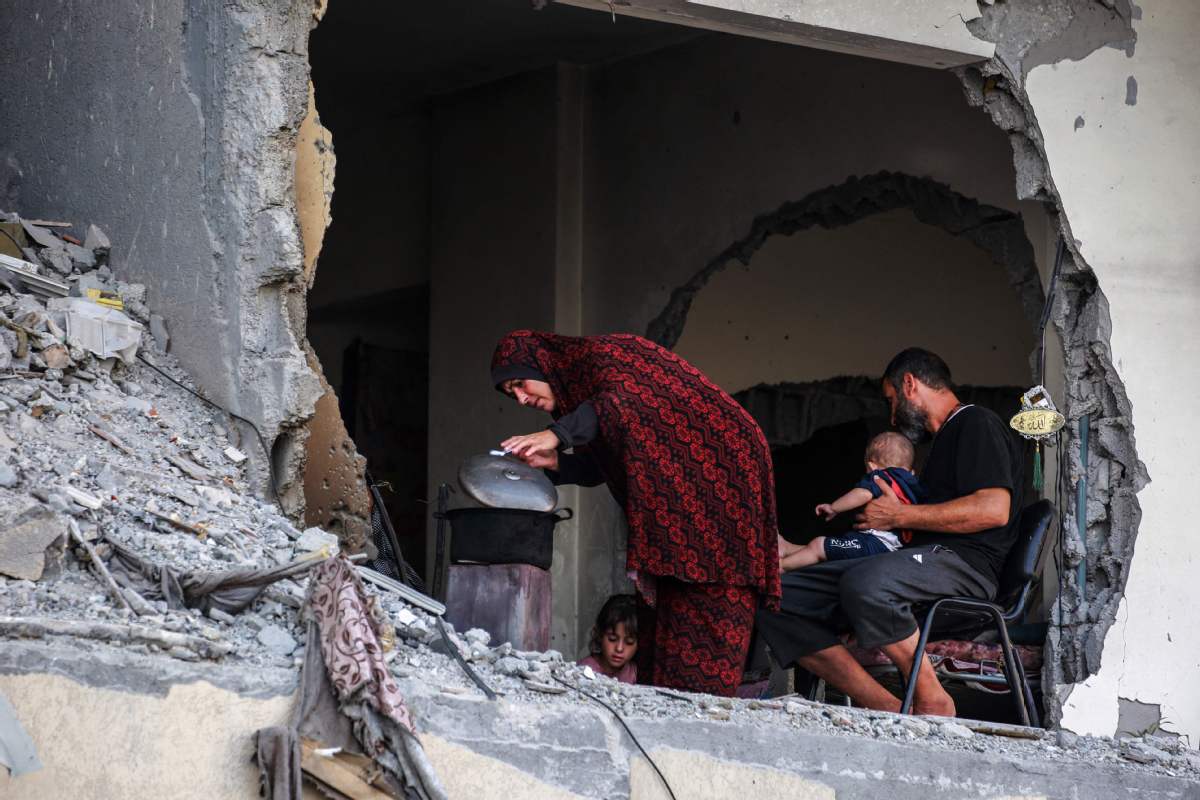
CAIRO/GAZA/JERUSALEM — Israeli Prime Minister Benjamin Netanyahu told US President Joe Biden on Thursday he has decided to send a delegation to resume stalled negotiations on a hostage release deal with Hamas, their administrations said.
A source from the Israeli negotiating team, speaking on condition of anonymity, said there was a real chance of achieving agreement after Hamas made a revised proposal on the terms of a deal.
"The proposal put forward by Hamas includes a very significant breakthrough," the source said.
The Israeli response to the Hamas proposal, submitted via mediators, was in marked contrast to past instances during the nearly nine-month conflict in Gaza, where Israel has said the conditions attached by Hamas were not acceptable.
An Israeli official said the head of Israel's Mossad intelligence agency would lead the Israeli delegation for talks.
Netanyahu was scheduled later on Thursday to have consultations with his negotiating team, and then discuss the hostage release talks with his security cabinet.
Israel received Hamas' response on Wednesday to a proposal made public at the end of May by Biden that would include the release of about 120 hostages held in Gaza and a cease-fire in the enclave.
A Palestinian official close to the mediation efforts told Reuters that Hamas has shown flexibility over some clauses that would allow a framework agreement to be reached should Israel approve.
Two Hamas officials did not immediately respond to requests for comment. Hamas has said any deal must end the conflict and a full Israeli withdrawal from Gaza. Israel maintains it will accept only temporary pauses in the fighting until Hamas is eradicated.
It was not clear where the Israeli delegation would go to resume talks. Prior efforts to end the Gaza conflict were mediated by Egypt and Qatar, with talks held in both locations.
In Gaza, Palestinians reacted cautiously to the prospect of renewed talks.
"We hope that this is the end of the war, we are exhausted and we can't stand more setbacks and disappointments," said Youssef, a father of two, now displaced in Khan Younis in the south of the enclave.
On Thursday, Gaza's health ministry said the Palestinian death toll in the nearly nine months of conflict had passed 38,000, with 87,445 wounded.
Ongoing strikes
An Israeli strike hit a school in Gaza City and the Civil Emergency Service said five Palestinians were killed and others wounded, while other Israeli strikes on Gaza City's old town on Thursday killed a woman and wounded several others, medics said.
The Israeli military said it had been operating to dismantle Hamas' military and administrative capabilities. It said it was acting in accordance with international law and taking feasible precautions to minimize civilian casualties.
In another development, Israel's regulatory body has approved plans for building 5,295 new settler homes throughout the occupied West Bank, a settlement monitoring group said on Thursday.
Peace Now, a settlement watchdog based in Israel, stated in a news release that the Higher Planning Council of the Civil Administration approved the new construction during a two-day discussion on Wednesday and Thursday.
The approval of the new settler housing units came a day after Israeli authorities approved the appropriation of 12.7 square kilometers of land in the West Bank, marking the largest single appropriation in about three decades.
These moves are likely to stoke further tensions in the region, which is already experiencing increasing violence.
Xinhua
UNITED NATIONS -- China on Tuesday called on Israel to fulfill its obligations under international humanitarian law and heed the international community's call to ensure the rapid and safe entry of humanitarian supplies into Gaza.
In remarks at the UN Security Council briefing on the situation in the Middle East, including the Palestinian question, China's permanent representative to the United Nations Fu Cong highlighted the severe humanitarian crisis in Gaza, exacerbated by extreme shortages of essential supplies and dire health conditions.
He noted that "millions of people are struggling with hunger, disease, pain, and despair," describing the situation as a man-made humanitarian disaster and a serious breach of international law.
Fu pointed out that Gaza has been under blockade for nine months, with over 2 million people living in an "open-air prison" without adequate access to water, electricity, food, medication, and fuel.
He criticized the closure of the Rafah crossing due to Israeli military operations, which has left thousands of trucks loaded with humanitarian supplies waiting in long lines.
"The existing crossing points are far from being able to meet the demand for humanitarian aid," Fu said, emphasizing that land transport routes are key to expanding humanitarian access.
Fu also addressed the obstruction of humanitarian supplies and the challenges faced by humanitarian workers, who encounter unreasonable difficulties and accusations.
He condemned the repeated attacks on facilities of humanitarian agencies and noted that over 200 humanitarian workers have died in the conflict, calling this "unprecedented in history and shocking."
Reiterating that "hunger cannot be weaponized, humanitarian issues cannot be politicized," Fu said the man-made exacerbation of the humanitarian disaster is "unacceptable."
Fu urged Israel to ensure the "rapid and safe entry of humanitarian supplies at scale into Gaza," and to cooperate fully with the United Nations and other humanitarian organizations.
The council's adoption of resolution 2720 aimed to expand humanitarian access, but its implementation has fallen short.
Fu called for an examination of the reasons behind this and urged the concerned parties to work harder to remove obstacles to the large-scale entry of humanitarian aid into Gaza.
Fu concluded by emphasizing that the fundamental way to alleviate the humanitarian disaster is through a lasting ceasefire and the early relaunch of the two-state solution.
He called on the international community to continue efforts toward this end and supported the council in taking further necessary action.

JERUSALEM - Israeli Prime Minister Benjamin Netanyahu said on Monday that his country is in "the final stage" of eliminating Hamas' armed force in the Gaza Strip.
"We are advancing towards the completion of the elimination" of Hamas, Netanyahu said during a meeting with cadets from Israel's National Security College, according to a statement released by his office.
Netanyahu's estimate came a day after he toured the Gaza Division and held a security assessment meeting, with Defense Minister Yoav Gallant and the army's senior command, on Israel's nine-month-long offensive in Gaza, "with emphasis on the fighting in Rafah, as well as the continuation of military pressure on Hamas," according to Netanyahu's office.
Also on Monday, the Israel Defense Forces (IDF) ordered a mass evacuation of civilians from the eastern Khan Younis, signaling that ground forces might soon resume their offensives in the southern Gazan city, presumably to fight Hamas forces that have regrouped in the area.
Israel completed a large-scale attack in Khan Younis in early April and subsequently withdrew most of its forces.

RAMALLAH - The Palestinian presidency on Sunday rejected any foreign presence on Palestinian lands, in response to Israeli statements calling for the handover of the Gaza Strip to international forces.
In a declaration carried by the official news agency WAFA, Nabil Abu Rudeineh, spokesperson for the presidency, said that "there is no legitimacy for any foreign presence on Palestinian lands, and only the Palestinian people can decide who governs and manages their affairs."
He stressed that the Israeli government "is delusional if it thinks it can decide the fate of the Palestinian people and cement the occupation by bringing in foreign forces".
The spokesperson called the Palestine Liberation Organization the sole legitimate representative of the Palestinian people, which "has legal authority over all of Palestine's territory, including Gaza, the West Bank, and Jerusalem".
He emphasized that "the Palestine issue is about land and statehood, not just humanitarian aid; it is a sacred issue and the central cause for Arabs."
On Friday, Israeli public radio Kan reported that Israeli Defense Minister Yoav Gallant discussed the transitional phase plan for Gaza during his visit to the United States days ago.
The plan would be overseen by a steering committee led by the US and involving moderate Arab countries, according to the radio.
The international forces, possibly including soldiers from Egypt, Jordan, the United Arab Emirates, and Morocco, would oversee security in Gaza while the American side would handle leadership and logistics from outside the strip, likely in Egypt, it reported.
The plan will be implemented in stages from north to south Gaza and aims for the gradual transfer of local security responsibilities to Palestinian forces, the report said.
It noted that the plan assumes that Hamas's military capabilities have been sufficiently reduced, rendering the group unable to conduct large-scale attacks.
Israel's National Security Adviser Tzachi Hanegbi stated last Tuesday during a conference at the Reichman University in Herzliya that "the post-war plan for Hamas and Gaza has been prepared in recent weeks, and we will soon see practical steps towards this."
He added, "We do not have to wait for Hamas to disappear, as it is a long process," explaining, "We cannot eliminate Hamas as an idea; we need an alternative idea."
Hanegbi believes that establishing an alternative to replace Hamas is essential for achieving long-term victory, saying that the alternative should be a government supported by local residents who wish to live alongside Israel, with backing from moderate Arab countries.
Israeli Prime Minister Benjamin Netanyahu had faced widespread criticism from within and outside Israel for not presenting a clear post-war plan for Gaza.
Israel has been conducting a large-scale offensive against Hamas in Gaza to retaliate against a Hamas rampage through the southern Israeli border on Oct 7, 2023, during which about 1,200 people were killed and more than 200 were taken hostage.
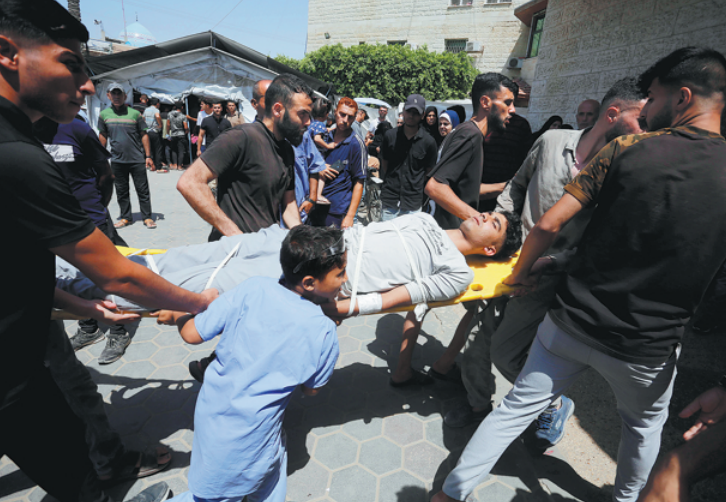
GAZA/JERUSALEM — Airstrikes and gunfire rattled northern Gaza over the weekend, where Israeli military operations have uprooted tens of thousands of Palestinians and compounded what the UN called "unbearable" living conditions in the territory.
Explosions were heard from the Shujaiya area near Gaza City, and Israeli forces advanced further on Sunday.
The armed wings of both Hamas and the Palestinian militant group Islamic Jihad said they were engaged in fighting with Israeli forces there.
Israel's military on Saturday reported two soldiers killed and two severely wounded in combat in northern Gaza.
The Israeli forces also pushed deeper into western and central Rafah in the south.
Israeli Prime Minister Benjamin Netanyahu said a week ago the "intense phase" of the assault was winding down after almost nine months, but experts see a potentially prolonged next phase.
Mediators' efforts have failed to conclude a truce, with both sides blaming each other for the impasse.
Senior Hamas official Osama Hamdan said on Saturday there had been no progress in cease-fire talks with Israel over the conflict.
The Palestinian group is still ready to "deal positively" with any cease-fire proposal, Hamdan told a news conference in Beirut.
Hamas politburo chief Ismail Haniyeh on Saturday discussed with Egyptian intelligence chief Abbas Kamel the course of the negotiations to achieve a cease-fire in the Gaza Strip.
The call came after Israel's Hebrew public radio Kan reported that the US administration presented a revised version of a prisoner exchange deal that includes a ceasefire between Israel and Hamas.
The Israeli offensive has killed at least 37,877 Gazans, in response to Hamas' surprise attack in Israel on Oct 7, which killed around 1,200 people and took about 250 hostages.
At a Tel Aviv mass rally against Netanyahu's government on Saturday, a former hostage said "we must do everything to bring them back home", referring to the hostages in Gaza.
The United Nations humanitarian agency OCHA estimated that "about 60,000 to 80,000 people were displaced" from the area last week. Louise Wateridge, spokeswoman for UNRWA, said: "It's really unbearable."
The conflict has also uprooted people on the Israel-Lebanon border, where the Hezbollah movement and Israeli forces have engaged in near-daily exchanges of fire.
Agencies - Xinhua
